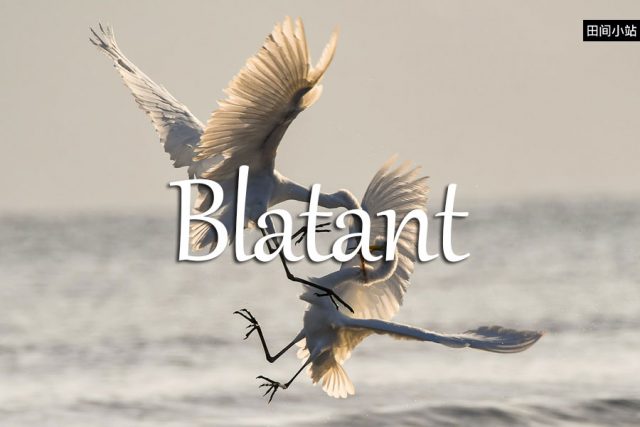
SAT TEM8 GRE
外刊例句
- It seems reasonable for companies to expect some level of economic return on any wellness programme that they provide. But the trade-off should not be too blatant.
对企业来说,期望自己提供的任何健康计划都能产生一定的经济回报似乎也合情合理。但这种交换的动机不该太过赤裸裸。
——《经济学人》 - It was not a surprise that President Vladimir Putin of Russia came out in strong support of FIFA against the “blatant attempt” of the United States “to extend its jurisdiction to other states.”
不出预料,俄罗斯总统弗拉基米尔·普京站在国际足联一边,强烈反对美国“公然企图将其司法管辖权拓展到其他国家”。
——《纽约时报》
基本释义
[adjective] (of bad behavior) done openly and unashamedly
[形容词] 公开无耻地做(不好的行为)
深入解读
Blatant 一词由英国桂冠诗人埃德蒙·斯宾塞(Edmund Spenser)于1596年在其史诗《仙后》(The Faerie Queene)中创造而来,用于形容一个有着一千条舌头的怪物,并将其称为 blatant beast 。
在 小词详解 | trivial 中,小站曾提到“三个女人一台戏”,三个舌头已然叽叽喳喳个不停,那要是一千条舌头岂不是得把人吵死。所以到了17世纪中期, blatant 开始用于形容人“吵嚷的、喧闹的”,比如:
- 你不必为这事吵吵嚷嚷。
You don't have to be blatant about it.
喧嚣吵闹的声音是一种声污染,而与之类似的还有炫耀刺眼的光线是一种光污染。于是到了18世纪后期, blatant 开始引申用于形容事物“炫耀的、刺眼的、俗丽的”,比如:
- 某人衣服刺眼的色彩
the blatant colours of somebody's dress
无论是吵嚷的声音还是刺眼的色彩,都是以一种不好的方式引人注目。因此到了19世纪末期, blatant 进一步引申为“明目张胆的、公然的”,比如:
- 弥天大谎
blatant lie - 对一国内政的公然干预
blatant intrusion into a nation's internal affairs
名人用例
What incensed him the most was the blatant jokes of the ones that passed it all off as a jest, pretending to understand everything and in reality not knowing their own minds.
最让他恼火的是那些把这一切当成笑话的人的公然笑话,他们假装明白一切,实际上却不知道自己的想法。
出自爱尔兰作家和诗人詹姆斯·乔伊斯(James Joyce,1882年2月2日-1941年1月13日)。其代表作包括短篇小说集《都柏林人》(Dubliners)、长篇小说《一个青年艺术家的画像》(A Portrait of The Artist as a Young Man)、《尤利西斯》(Ulysses)以及《芬尼根的守灵夜》(Finnegans Wake)。
同近义词
- flagrant: (of something considered wrong or immoral) conspicuously or obviously offensive
- patent: easily recognizable; obvious
- overt: done or shown openly; plainly or readily apparent, not secret or hidden
